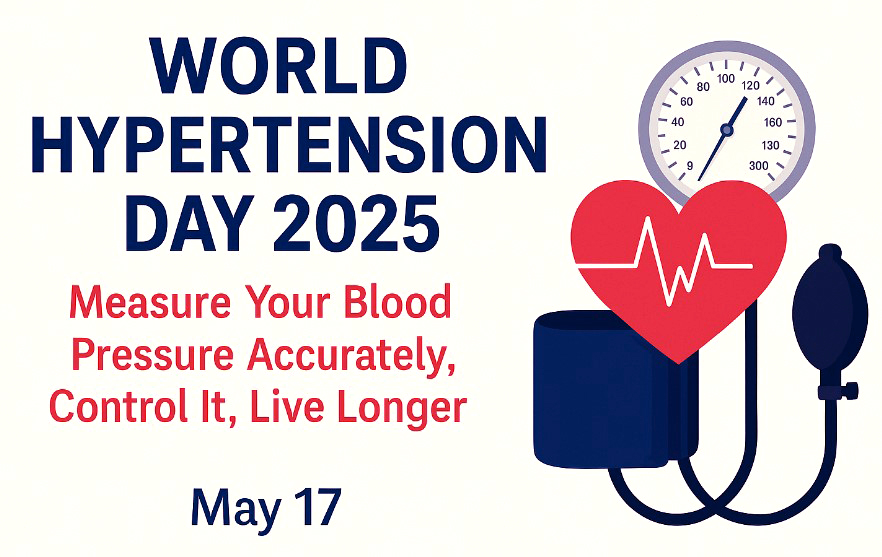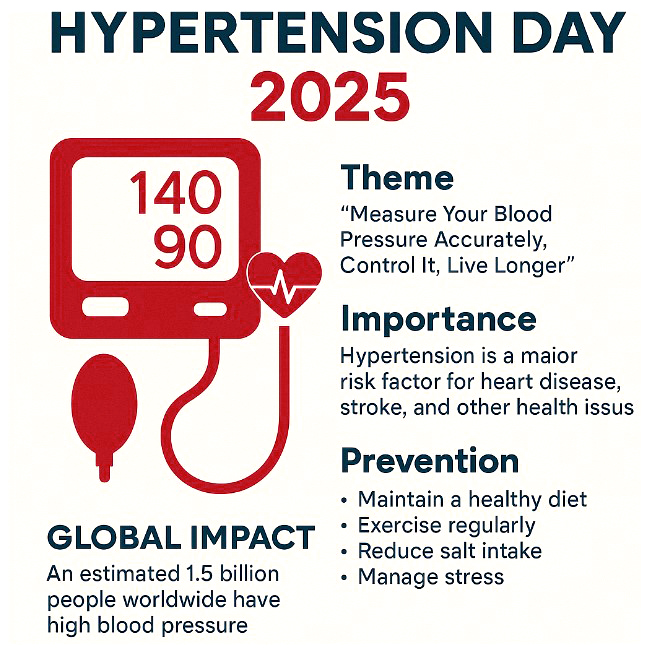Meta Description:Learn about World Hypertension Day 2025 – discover its theme, importance, causes of high blood pressure, preventive tips, awareness events, and global statistics. Stay heart-healthy!
World Hypertension Day 2025
World Hypertension Day 2025 is a global health promotion event that occurs on May 17 every year. The day is used to educate the public about high blood pressure (hypertension) as a silent killer. World Hypertension Day is organized by the World Hypertension League (WHL). This annual day is used to bring awareness to the diagnosis, prevention and management of hypertension, an important contributor to the global epidemic of heart disease, stroke, and premature death.
When is World Hypertension Day in 2025?
World Hypertension Day is recognized on May 17 every year. In 2025, it happens to fall on a Saturday, which opens up an opportunity to engage with the community through events such as health camps, blood pressure screening efforts, information kiosks, and educational discussions. The day is part of an overall health promotion effort to raise awareness about blood pressure and to encourage members of your community to take their heart health seriously.
World Hypertension Day 2025
The theme for World Hypertension Day 2025 is “Measure Your Blood Pressure Accurately, Control It, Live Longer.” This signals a return to an emphasis on the importance of accurately measuring blood pressure, as a valid measurement forms the basis for effective diagnosis and management in both the short and long-term. The theme encourages routine blood pressure screenings, consultations with a medically qualified healthcare provider, and lifestyle modifications to facilitate control of blood pressure and more effectively prevent the complications associated with hypertension.
History and Background
World Hypertension Day was first observed in 2005 under the auspices of the World Hypertension League, to focus attention on the epidemic of high blood pressure. Over the years it has morphed into a huge global health day, supported by the World Health Organization (WHO) and other international health organisations. The themes and campaigns over the years have helped the public to be more aware about hypertension, and have led to more hypertension screenings worldwide.
Why is World Hypertension Day Important?
Hypertension is often referred to as the “silent killer” because there are usually no symptoms until problems develop. The WHO reports there are more than 1.4 billion people with high blood pressure worldwide, and many don’t know they have high blood pressure. World Hypertension Day is important because we want to advocate for early detection and treatment, and educate everyone on the hazards of uncontrolled hypertension.
What is Hypertension?
Hypertension, or high blood pressure, is when the force of blood against the artery walls is higher than it should be over a sustained period of time. Blood pressure is represented as values of systolic (upper) and diastolic (lower). For example, a normal BP reading would be in the vicinity of 120/80. The moment BP rises above 130/80 it is considered elevated, or hypertensive. When BP remains elevated, it can lead to damage to blood vessels, strain on the heart, and increased risk for strokes, kidney damage, vision loss, and more.
Causes and Risk Factors of Hypertension
There are numerous risk factors and causes of high blood pressure such as genetics, a lack of physical activity, diet (including eating poorly), excess salt etc., being overweight, chronic stress, smoking and drinking. Certain health conditions such as diabetes or kidney disease can also cause secondary hypertension. Knowing the causes is important to preventing and avoiding high blood pressure.
Global Statistics on Hypertension 2025
There is still a growing impact of hypertension worldwide. WHO estimated in 2025 that over 1.5 billion people could be living with hypertension, with more of that burden coming from low- to middle-income countries that are already struggling to maintain the health of their populations and have limited access to quality health care, and were fewer people are aware of the health risks. Urbanization, poor diets leading to the increase in obesity, and rising hypertension rates and cases are being seen throughout Asia, Africa and Latin America, as demonstrated by WHO’s statistics.
Symptoms and Early Signs of High Blood Pressure
One of the key dangers of hypertension is that it is considered asymptomatic. In most cases, a person may not feel rising hypertension until it is too late. But there are some symptoms that could arise that can be considered early warning signs of hypertension to monitor which may include a headache, chest pain, blurred or reduced vision, shortness of breath, and dizziness/fainting. The only reliable way to monitor a patient for high blood pressure correctly is to use BP devices.
Hypertension and Related Health Consequences
Uncontrolled high blood pressure, or hypertension, can damage organs. Why? Because it raises the risk for stroke, heart attack, heart failure, kidney disease, and retinopathy. Additional studies have evaluated cognitive decline and dementia as related health consequences of hypertension in older adults. Treating this condition can result in saving lives and a dramatic reduction in global costs in healthcare!
Hypertension Prevention and Control
Preventing hypertension can begin with lifestyle factors. Some of the most effective strategies for decreasing your risk of hypertension include eating a diet full of fruits, vegetables and whole grains, limiting sodium and sugar; maintaining a routine physical fitness regimen, at least 30 minutes almost every day, coping with stress levels; sticking to the quit smoking; and moderating alcohol consumption. Obtaining regular BP readings and adhering to medication non-adherence (if prescribed) are also important effective control strategies.

Recommendations for Natural Products, Remedies, and Lifestyle Modifications
In addition to traditional treatments for high blood pressure and hypertension, there are also many natural remedies shown to promote heart health and lower blood pressure. Some foods known for their heart-healthy benefits include garlic and beetroot, and many health practitioners endorse the benefits of bananas. There are also many psychosocial factors or programs, including yoga, meditation, and deep-breathing techniques, shown to help manage stress and also lower blood pressure. Weight loss, in overweight individuals, is a significant factor in managing hypertension.
Global Awareness Events and Activities 2025
As part of World Hypertension Day 2025, many events will take place around the globe, such as free blood pressure screening camps, health workshops, public marches provided by families and health organizations, and online webinars. Hospitals and health organizations will disseminate materials on the significance of regular BP checks, and the promotion of a heart-healthy lifestyle.
The Role of WHO and International Organization
The WHO, and subsequently the World Hypertension League is a major supporter of global hypertension awareness. WHO supports countries in bolstering primary healthcare systems, increasing BP surveillance, and increasing access to affordable medications and lifestyle education as part of initiatives like the WHO Global HEARTS Initiative.
How to Get Involved and Promote Awareness
Individuals can be involved in World Hypertension Day 2025 by participating in local events, or donating time and resources in organization of an event. People can promote awareness on social media platforms with messaging attached to hashtags, engaging in spreading the word and increasing awareness activity, while inviting family and friends to get their BP checked, as #WorldHypertensionDay or #MeasureBP are examples. Schools, companies, and NGOs should run education campaigns, using social media as a platform, and engage with local health professionals to provide education talks on hypertension awareness.
FAQs about Hypertension and World Hypertension Day
Q1: Is high blood pressure curable?
A: No, but it is manageable with lifestyle changes and medication.
Q2: How often should you check your BP?
A: At least once every 6–12 months for healthy individuals, more frequently for those at risk.
Q3: What is the normal BP range?
A: Generally, around 120/80 mmHg.
Q4: Which foods reduce high BP?
A: Leafy greens, garlic, flaxseeds, oats, and low-fat dairy.
Conclusion
World Hypertension Day 2025 is an important reminder that heart health and blood pressure awareness should be a priority for each of us. Hypertension is one of the most common diseases, it is also one of the most preventable diseases. Keeping track of your blood pressure and being educated on your heart health starts with early detection, understanding your options, and taking a proactive approach to managing your lifestyle in relation to your health. Hopefully, this global signal of togetherness will be a launch pad for understanding a condition that is often called “the silent killer”. On May 17th, I hope you get the opportunity to Measure, Monitor and Manage your blood pressure. Remember: a healthy heart leads to a longer life.
SEO Keywords:world hypertension day 2025, world hypertension day theme 2025, when is world hypertension day 2025, importance of hypertension day, hypertension prevention tips, high blood pressure causes, global hypertension statistics 2025, awareness on high blood pressure, world health day for hypertension, blood pressure awareness campaign, how to reduce high blood pressure naturally, hypertension day slogan 2025, hypertension control guidelines, heart health awareness 2025, healthy lifestyle to prevent hypertension, high BP awareness, world hypertension day activities, medical facts about high blood pressure, hypertension screening camps 2025, global hypertension awareness campaign
![]()

